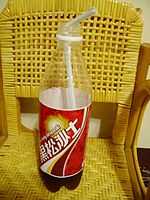Sarsaparilla (soft drink)

Sarsaparilla is a soft drink, originally made from the Smilax regelii plant, but now sometimes made with artificial flavours.
Sarsaparilla was popular in the United States in the 19th century. According to advertisements for patent medicines of the period, it was considered to be a remedy for skin and blood problems. Ruth Tobias notes that it evokes images of "languid belles and parched cowboys."[1] In Hollywood westerns from the 1930s to the 1950s, ordering sarsaparilla in a saloon (instead of whiskey) is often met with mockery by the manly cowboys nearby. Sarsaparilla drinks feature widely in American popular culture, particularly in works related to the American West. In the 1957-1961 ABC western television series, Sugarfoot, the title character, Tom Brewster, played by Will Hutchins, is a teetotaler who orders sarsaparilla "with a dash of cherry" whenever he enters a saloon.
Now, however, sarsaparilla is sometimes considered a type of root beer. There are dozens of brands of sarsaparilla made by microbreweries, mainly in the United States.[2]
Sarsaparilla is not readily available in most countries, although many pubs and most major supermarket chains in the Philippines, Taiwan, Malaysia and Australia stock sarsaparilla-flavored soft drinks. Australian sarsaparilla has a different flavor from American root beer or sarsaparilla. Bundaberg brews sarsaparilla from "real sarsaparilla root, licorice root, vanilla beans and molasses."[3]
Sarsi is a sarsaparilla-based drink popular in Asia.
Baldwin's produce a Sarsaparilla Cordial in the United Kingdom, and have done since 1844. It is produced in Walworth Road, London and is readily available in Pie & Mash shops in the East End of London, where it is popular, as well as being available in the Supermarket Tesco.
U.S. classic sarsaparilla was not made from the extract of the sarsaparilla plant, a tropical vine distantly related to the lily. It was originally made from a blend of birch oil and sassafras, the dried root bark of the sassafras tree. Sassafras was widely used as a home remedy in the nineteenth century – taken in sufficient doses, it induces sweating, which some people thought was a good thing. Sarsaparilla apparently made its debut as a patent medicine, an easy-to-take form of sassafras, much as Coca-Cola (then a easy-to-take form of cocaine) was first marketed in 1885 as a remedy for hangovers, headaches and morphine addiction.[4] Besides the effects of the ingredients, sodas were popular in the United States at the time, due to the belief that carbonated water was good for the health.[5]
In popular culture
Sarsaparilla is mentioned with variant spellings in several songs, perhaps most notably in the lyrics to George and Ira Gershwin's song "Let's Call the Whole Thing Off," in the line, "You sa's'parilla and I sa's'parella" (also written as "You saspiralla, and I saspirella"),[6][7] introduced as a duet in the 1937 film Shall We Dance by Fred Astaire and Ginger Rogers, but also recorded in a highly successful version by Louis Armstrong and Ella Fitzgerald included on the latter's 1957 album Ella and Louis Again. The Canadian band The Gandharvas released a song entitled "Sarsaparilla" in 1997 on their album Sold for a Smile. The 2004 album The Man in a Blue Turban with a Face by the U.S. band Man Man included a track named "Sarsparillsa."
In the feature film The Big Lebowski, "The Stranger" asks if they have a good sarsaparilla at the bowling alley bar. The bartender gets him a Sioux City.
A fictional brand of sarsaparilla called "Sunset Sarsaparilla" is featured in the award-winning video game Fallout: New Vegas. The drink plays a large role in the game, being one of the most common aid items and the focal point of the quest The Legend of the Star, where the player must collect 50 special Sunset Sarsaparilla Star bottle caps.
Sarsaparilla is mentioned in episode 18 of season 6 of the American television show Supernatural, entitled "Frontierland," where Sam and Dean Winchester get sent back in time to Sunrise, Wyoming on March 4, 1861 by the angel Castiel to retrieve the ashes of a Phoenix. The boys end up in a saloon where Dean, who is a fan of Western movies, orders a whiskey for himself and a sarsaparilla for his brother Sam to jokingly imply that Sam is not as manly as he is. He later regrets it when his whiskey "...tastes like gasoline." and Sam smirks and comments that "The Sarsaparilla ain't half bad."
References
- ↑ Tobias, Ruth (2007). "Sarsaparilla". In Smith, Andrew F. The Oxford Companion to American Food and Drink. Oxford University Press. p. 550.
- ↑ "Sarsaparilla Reviews".
- ↑ "Sarsaparilla". Bundaberg Brewed Drinks. Retrieved 28 April 2012.
- ↑ Whatever happened to the soft drink sarsaparilla? December 16, 1977 by Cecil Adams, retrieved 2013-04-30
- ↑ "Themes for Coca-Cola Advertising (1886–1999)". Archived from the original on January 18, 2010. Retrieved 2007-02-11.
- ↑ Lyrics Depot, "Let's Call The Whole Thing Off" (Fred Astaire/Ginger Rogers version)
- ↑ Lyrics007, "Let's Call The Whole Thing Off" (Louis Armstrong/Ella Fitzgerald version)